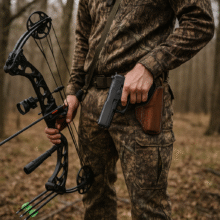The Physical Demands of Hunting: Preparing for the Challenge

Table of Contents
- Introduction
- 1. Endurance and Stamina
- 2. Strength and Stability
- 3. Flexibility and Mobility
- 4. Mental Resilience
- 5. Nutrition and Hydration
- 6. Altitude Acclimatization
- 7. Weather Preparedness
- 8. Tactical Movement and Stealth
- 9. Recovery and Injury Prevention
- 10. Gear Weight Management
- 11. Nutrition and Energy Management
- Conclusion
- Frequently Asked Questions (FAQs)
Introduction
Hunting is not just a test of skill and patience; it’s also a physically demanding activity that requires hunters to be in good physical condition. The terrain, the weather, and the sheer endurance needed for stalking or tracking game can challenge even the most experienced hunters. Understanding and preparing for these physical demands is crucial for a successful and enjoyable hunt.
1. Endurance and Stamina
1.1 Cardiovascular Fitness
- Long Treks: Hunters often cover long distances on foot, sometimes in challenging terrain. Cardiovascular fitness is essential for maintaining energy levels throughout the hunt.
1.2 Training Tips
- Regular Cardio: Incorporate running, hiking, cycling, or swimming into your regular fitness routine to build up your endurance.
2. Strength and Stability
2.1 Muscle Strength
- Carrying Gear: The weight of your gear, including firearms, ammunition, and survival supplies, can be significant. Upper and lower body strength ensures you can carry this load comfortably.
2.2 Core Stability
- Maintaining Balance: Navigating uneven terrain requires a strong core to maintain balance and prevent falls.
2.3 Training Tips
- Weight Training: Focus on functional fitness exercises that mimic hunting activities, such as squats, lunges, deadlifts, and core strengthening routines.
3. Flexibility and Mobility
3.1 Range of Motion
- Avoiding Injury: Flexibility helps in avoiding injuries by allowing your body to move freely and adapt to the terrain.
3.2 Training Tips
- Stretching Routine: Incorporate dynamic stretching into your daily routine to improve flexibility and static stretching post-exercise to aid recovery.
4. Mental Resilience
4.1 Mental Endurance
- Focus and Concentration: The mental stamina to stay alert and focused during long periods of inactivity is crucial for spotting game and making ethical shots.
4.2 Stress Management
- Coping with Adversity: Hunting can be unpredictable. The ability to manage stress and remain calm under pressure is vital.
4.3 Training Tips
- Mindfulness and Visualization: Practice mindfulness techniques and visualize successful hunts to build mental resilience.
5. Nutrition and Hydration
5.1 Fueling the Body
- Energy and Recovery: Proper nutrition before and during the hunt supports energy levels and recovery. Focus on a balanced diet rich in proteins, carbohydrates, and healthy fats.
5.2 Staying Hydrated
- Water Intake: Dehydration can quickly sap your strength and focus. Carry enough water and drink regularly, even in cold weather.
6. Altitude Acclimatization
6.1 High-Altitude Hunting
- Reduced Oxygen Levels: Hunting in high-altitude environments can be physically taxing due to reduced oxygen levels. Acclimatization days and gradual ascents are recommended.
6.2 Training Tips
- Preparation: If possible, train in higher altitudes prior to your hunt or use altitude training masks to simulate conditions.
Expanding on the comprehensive approach to preparing for the physical demands of hunting, let’s delve into additional strategies and insights to ensure hunters are optimally prepared for the rigors of the hunt.
7. Weather Preparedness
7.1 Adapting to Extreme Conditions
- Resilience to Weather: Whether braving the cold, heat, rain, or snow, hunters must be prepared for all weather conditions. This requires not only physical but mental readiness to endure discomfort.
7.2 Training Tips
- Environmental Training: Whenever possible, train under similar weather conditions to those expected during your hunt. This acclimatization can help your body adjust to extreme temperatures and improve your overall resilience.
8. Tactical Movement and Stealth
8.1 Quiet Movement
- Stealth Techniques: Moving silently through various terrains without startling game is a skill that demands both physical agility and mindfulness. Practice moving quietly and with purpose in your training.
8.2 Training Tips
- Balance and Coordination Exercises: Incorporate balance beams, agility ladders, and stealth walks into your routine to enhance your ability to move quietly and efficiently.
9. Recovery and Injury Prevention
9.1 Importance of Rest
- Adequate Recovery: Ensuring proper rest between training sessions and during the hunt itself is crucial to prevent overuse injuries and maintain peak performance.
9.2 Training Tips
- Active Recovery: Incorporate light activities such as walking or yoga on rest days to promote muscle recovery and maintain flexibility.
10. Gear Weight Management
10.1 Optimizing Gear Load
- Efficient Packing: Carefully select and test your gear to ensure you’re carrying only what is necessary. An optimized load reduces physical strain and increases mobility and endurance.
10.2 Training Tips
- Pack Training: Regularly hike with a loaded pack that simulates your hunting gear’s weight to build strength and condition your body for the load you’ll carry during the hunt.
11. Nutrition and Energy Management
11.1 On-the-Go Nutrition
- Energy Sustenance: Pack high-energy, nutrient-dense foods that are easy to consume on the move. Nuts, jerky, energy bars, and dried fruits are excellent choices for maintaining energy levels without weighing you down.
11.2 Hydration Strategies
- Electrolyte Balance: In addition to water, consider electrolyte supplements to prevent dehydration and maintain energy levels, especially during hunts in extreme heat or at high altitudes.
Conclusion
The physical demands of hunting are as diverse as the hunting experiences themselves. By preparing your body and mind through targeted training, nutrition, and acclimatization, you can enhance your hunting performance, ensure your safety, and enjoy the wilderness to its fullest. Remember, the key to overcoming the physical challenges of hunting lies in preparation, perseverance, and a deep respect for the natural world.
Frequently Asked Questions (FAQs)
How long before a hunt should I start training?
- Ideally, begin your physical preparation 3 to 6 months in advance, allowing your body to gradually build strength, endurance, and flexibility.
Can yoga or pilates help in hunting preparation?
- Yes, yoga and pilates are excellent for improving flexibility, core strength, and mental focus—all beneficial for hunting.
What’s the best way to carry heavy gear without getting tired?
- Use a well-fitted backpack with waist and chest straps to distribute weight evenly. Train with weighted packs to build strength and endurance.
How do I deal with muscle soreness during a hunt?
- Stay hydrated, consume protein-rich foods for recovery, and use foam rollers or stretching exercises to alleviate muscle soreness.







